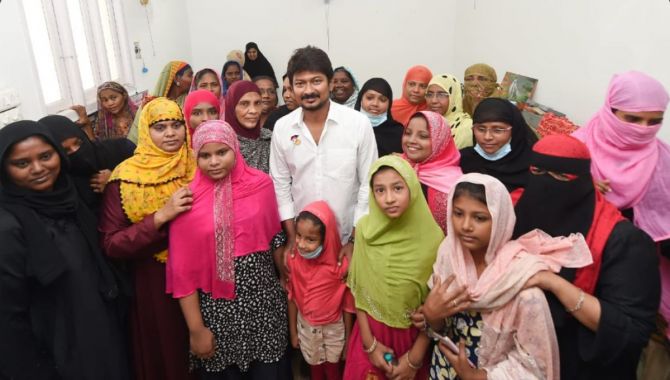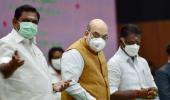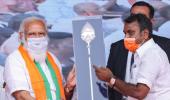'The DMK may get a little more than 50% of the minority vote.'
'The AIADMK always gets over 10% of the minority vote.'

At least two opinion polls have given the Dravida Munnetra Kazhagam front a clear majority in the Tamil Nadu assembly election.
It is the first assembly election that the Bharatiya Janata Party is contesting in league with the All India Anna Dravida Munnetra Kazhagam.
This tie-up, it is widely believed, will impact the minority votes in the state which have been divided between the AIADMK and DMK.
Speaking to A Ganesh Nadar/Rediff.com, Dr P Sakthivel, professor in the department of political science and public administration at Annamalai University who has specialised in Tamil Nadu's Muslim politics, says, "The minorities believe that the Dravidian parties will protect them. They will protect the identity of Muslims and the identity of Tamils."
As someone who has specialised in Tamil Nadu's Muslim politics, how do you see the entry of the BJP in the assembly election fray for the first time in the company of a Dravidian major?
This is not the first time they have allied with the AIADMK and the DMK. This time they have allied with the AIADMK and other parties in the front. They will be unable to get the majority of the votes of the minorities. This is evident from past elections.
The BJP was successful in Kanyakumari, Tirupur and Coimbatore where they were active and demanded more seats in these areas, and that is why the alliance talks were delayed.
What impact will the BJP's assembly election tie-up have on the state's inter-community dynamics, given that Tamil Nadu has long been held up as a model of communal amity?
The BJP aligning with the AIADMK or the DMK will not have much impact on the communities in Tamil Nadu. The alliance is only for electoral purposes.
In other states there may be political violence, but not in Tamil Nadu.
The expectation is that because of the BJP's entry thus, the minority vote will en masse go to the DMK camp. Do you think that is a possibility?
The DMK may get a little more than 50% of the minority vote. Kamal Hassan (of the Makkal Neethi Maiam) will get 4%-5% of the minority vote and Seeman (of the Naam Tamilar Katchi) will get 2%-3%.
The AIADMK always gets over 10% of the minority vote. It is their traditional vote bank.
How has the minority vote performed in the previous elections? Was it equally divided between the two Dravidian parties?
I call it the fragmentation of Muslim politics in Tamil Nadu. There are more than a dozen Muslim parties and minor political outfits among the Muslims.
The Indian Union Muslim League and the Tamilnadu Muslim Munnetra Kazhagam are very popular among the people, but as a Dravidian culture the Muslims vote more for the DMK than the AIADMK.
As the TMMK is aligned with the DMK, more votes go to the DMK.
Of the state's 234 seats, in how many assembly constituencies can we say the minority votes are decisive?
In 26 to 28 constituencies in Vellore, Coimbatore, Thanjavur, Pudukkottai and Kumbakonam if they vote en masse they can make a difference.
How do you see the entry of the Owaisis' AIMIM (All India Majlis e Ittehadul Muslimeen) in the election fray, in the company of T T V Dhinakaran? Will it have any purchase?
Not much. The Owaisis are not popular in Tamil Nadu, they lack popular leaders here. The IUML and TMMK are already popular here.
The Dravidian parties have so far subsumed identity and minority politics under the umbrella of their paguttharivu or rationality creed. Do you see this fraying at the edges?
This will not change. The minorities believe that the Dravidian parties will protect them. They will protect the identity of Muslims and the identity of Tamils.
MGR (the late AIADMK founder M G Ramachandran) and after him Jayalalithaa managed to bring faith into Dravidian politics where it became normal to visit temples, sport religious marks, and so on. Did this have an impact on the party's minority vote?
Actually the erosion in Dravidian ideology started with AIADMK under MGR. His successors also followed the same path.
The Muslims in Tamil Nadu are heterogeneous and not homogeneous. So they vote for both the Dravidian parties.
How do you see the BJP's growth trajectory in a state like Tamil Nadu that has resisted outside parties for more than 50 years?
This was because local issues were not being adequately focused or addressed by the national parties like the BJP and Congress.
The Communist parties are having some votes in Tamil Nadu, particularly in the coastal districts, Madurai, Coimbatore and Tirupur because they are labour-oriented. They address local issues for farmers and labourers. They address the livelihood issues of the local population.
The BJP calculated that post-Jayalalithaa and post-Karunanidhi the time was right for its grand entry into Tamil Nadu, but that belief seems to have been punctured.
How did the AIADMK contain the BJP and make it settle for only 20 seats whereas they initially spoke of leading the front in Tamil Nadu?
The BJP agreed to contest 20 seats because they realised that allowing the AIADMK to contest more seats gave it a better chance of winning the election and forming the government.










